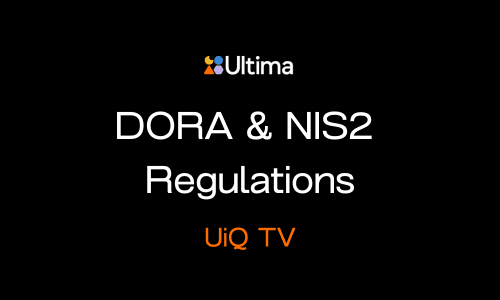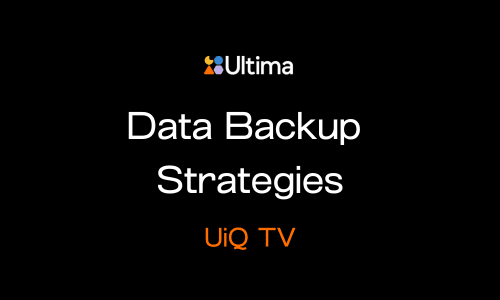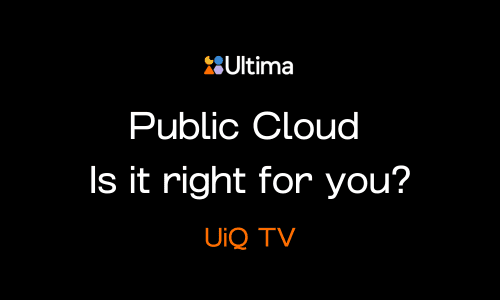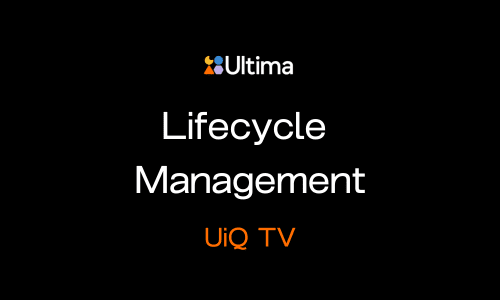UiQ TV: How to get Microsoft Copilot past Infosec
How to get your Security team happy to approve Microsoft Copilot
Digital WorkspaceOvercome information security barriers to Microsoft Copilot adoption with expert guidance from Ultima’s Vulcan Billj, Workspace Solution Specialist, and Jake Cutfield, Security Solution Specialist.
In this UIQ TV episode, the team addresses the most pressing concern preventing organizations from deploying Copilot: data security risks associated with AI-powered productivity tools accessing unstructured data across your Microsoft 365 environment.
While Copilot promises transformative productivity gains, security teams rightfully worry about sensitive information exposure, data loss, and potential reputational damage if AI inadvertently surfaces confidential content to unauthorized users. This session provides practical strategies to satisfy InfoSec requirements while unlocking Copilot’s business value.
The discussion reveals why traditional Data Loss Prevention (DLP) approaches fall short when securing Copilot deployments and introduces innovative solutions that automate data discovery, classification, and protection at scale. Jake explains how partnerships with leading security technology providers like Varonis enable organizations to identify and label sensitive data automatically, implement granular role-based access controls, and dramatically reduce the attack surface before Copilot goes live. The experts outline a proven methodology for Copilot security readiness assessments that address specific organizational concerns, from unstructured data governance to user access policies. Importantly, they highlight available Microsoft funding opportunities for cybersecurity assessments and advanced threat protection measures, making robust Copilot security more accessible for organizations of all sizes.
Whether your security team is blocking Copilot adoption due to data governance concerns or you’re proactively building a secure foundation before deployment, this video provides the roadmap you need. Learn how to conduct comprehensive security assessments, implement automated data protection controls, minimize risk exposure through strategic access management, and confidently demonstrate to InfoSec stakeholders that Copilot can be deployed securely.
Ultima’s consultative approach ensures your Copilot implementation balances productivity benefits with enterprise-grade security, protecting your organization’s most valuable asset—its data.
Copilot security: Frequently Asked Questions
Yes, when properly configured. Microsoft Copilot for Microsoft 365 is built on Microsoft’s enterprise-grade security infrastructure and respects your existing permissions and access controls. However, the challenge isn’t Copilot’s core security—it’s ensuring your underlying data governance is robust enough. Copilot can only surface information users already have access to, which means if your permissions are overly broad or sensitive data isn’t properly classified, Copilot could inadvertently expose it to unauthorized users. Ultima’s security readiness assessments identify these gaps before deployment, implementing automated data classification, role-based access controls, and continuous monitoring to ensure Copilot operates securely within your environment.
The primary security risks with Copilot deployment include:
-
Unstructured data exposure: Copilot can access and summarize information from emails, SharePoint documents, Teams chats, and OneDrive files. If sensitive data isn’t properly labeled or protected, users might inadvertently access confidential information.
-
Overprivileged access: Many organizations have excessive permissions granted over time. Copilot makes this “permissions sprawl” problem more visible and potentially more damaging.
-
Data leakage through AI prompts: Users might ask Copilot questions that cause it to aggregate sensitive information in new ways, potentially creating new data exposure scenarios.
-
Compliance violations: In regulated industries, Copilot could surface data that violates GDPR, HIPAA, financial regulations, or other compliance requirements if data governance isn’t properly configured.
-
Inadequate audit trails: Without proper logging and monitoring, security teams may struggle to track what information Copilot accesses and shares.
Ultima addresses these risks through comprehensive security assessments, automated data discovery and classification using tools like Varonis, and implementing least-privilege access principles before Copilot goes live.
Microsoft Copilot respects your existing Microsoft 365 information protection and data governance policies. It operates within your organization’s security boundary and doesn’t train on your data or share it with other organizations. Copilot adheres to:
- Sensitivity labels: If documents are labeled as “Confidential” or “Highly Confidential,” Copilot respects these classifications
- Microsoft Purview DLP policies: Data Loss Prevention rules you’ve configured apply to Copilot interactions
- Existing permissions: Copilot can only access content the user already has permissions to view
- Retention policies: Your data retention and deletion policies remain in effect
However, these protections only work if they’re properly configured. Many organizations discover during Copilot readiness assessments that their sensitivity labels are inconsistently applied, DLP policies have gaps, or permissions are too broad. Ultima helps organizations audit their current security posture and implement automated protection measures before enabling Copilot, ensuring sensitive data remains protected.
While Microsoft provides baseline security features with Microsoft 365 E3/E5 licenses, many organizations benefit from additional tools to achieve comprehensive Copilot security:
Essential for most organizations:
- Automated data discovery and classification (tools like Varonis or Microsoft Purview Information Protection)
- Advanced DLP policies beyond Microsoft’s native capabilities
- Privileged Access Management to control Copilot licensing for specific roles
Recommended for high-security environments:
- Data security posture management (DSPM) for continuous monitoring
- User behavior analytics to detect anomalous Copilot usage
- Advanced threat protection for AI-specific security threats
Ultima assesses your specific risk profile and regulatory requirements to recommend the optimal security stack for your Copilot deployment. We also leverage Microsoft funding opportunities to offset costs of security enhancements, making enterprise-grade protection more accessible.
The timeline for securing your environment for Copilot varies based on your current data governance maturity:
Fast-track (4-6 weeks):
- Organizations with existing sensitivity labels, well-managed permissions, and active DLP policies
- Focus on Copilot-specific configurations and user training
- Suitable for smaller organizations or those with mature security practices
Standard deployment (8-12 weeks):
- Organizations needing data discovery, classification automation, and permission remediation
- Includes security assessment, tool implementation, and phased rollout
- Most common timeline for mid-sized organizations
Comprehensive transformation (3-6 months):
- Organizations with significant unstructured data, complex permissions, or regulatory requirements
- Involves full data governance overhaul, extensive remediation, and change management
- Necessary for highly regulated industries or large enterprises with legacy systems
Ultima’s security readiness assessment provides a clear timeline and roadmap specific to your environment, so you’ll know exactly what’s required before committing to a full deployment.
Maintaining regulatory compliance with Copilot requires extending your existing compliance framework to cover AI-assisted workflows:
For GDPR compliance:
- Ensure Copilot respects data subject rights (access, deletion, portability)
- Configure retention policies so Copilot doesn’t surface data that should be deleted
- Document AI processing in your data protection impact assessments (DPIAs)
- Maintain audit logs of Copilot interactions involving personal data
For HIPAA compliance:
- Verify Copilot operates within your Business Associate Agreement (BAA) with Microsoft
- Implement additional access controls for Protected Health Information (PHI)
- Configure audit logging for all Copilot access to patient data
- Train users on PHI handling when using AI tools
For financial services regulations:
- Ensure Copilot interactions are captured in required communication archives
- Implement DLP policies preventing exposure of material non-public information (MNPI)
- Configure information barriers where required
- Maintain records management compliance
Ultima’s compliance specialists assess your specific regulatory requirements and design Copilot security configurations that satisfy auditors while enabling productivity. We also help document your compliance approach for regulatory submissions or audit responses.
Yes, when properly configured. Microsoft Copilot for Microsoft 365 is built on Microsoft’s enterprise-grade security infrastructure and respects your existing permissions and access controls. However, the challenge isn’t Copilot’s core security—it’s ensuring your underlying data governance is robust enough. Copilot can only surface information users already have access to, which means if your permissions are overly broad or sensitive data isn’t properly classified, Copilot could inadvertently expose it to unauthorized users. Ultima’s security readiness assessments identify these gaps before deployment, implementing automated data classification, role-based access controls, and continuous monitoring to ensure Copilot operates securely within your environment.
The primary security risks with Copilot deployment include:
-
Unstructured data exposure: Copilot can access and summarize information from emails, SharePoint documents, Teams chats, and OneDrive files. If sensitive data isn’t properly labeled or protected, users might inadvertently access confidential information.
-
Overprivileged access: Many organizations have excessive permissions granted over time. Copilot makes this “permissions sprawl” problem more visible and potentially more damaging.
-
Data leakage through AI prompts: Users might ask Copilot questions that cause it to aggregate sensitive information in new ways, potentially creating new data exposure scenarios.
-
Compliance violations: In regulated industries, Copilot could surface data that violates GDPR, HIPAA, financial regulations, or other compliance requirements if data governance isn’t properly configured.
-
Inadequate audit trails: Without proper logging and monitoring, security teams may struggle to track what information Copilot accesses and shares.
Ultima addresses these risks through comprehensive security assessments, automated data discovery and classification using tools like Varonis, and implementing least-privilege access principles before Copilot goes live.
Microsoft Copilot respects your existing Microsoft 365 information protection and data governance policies. It operates within your organization’s security boundary and doesn’t train on your data or share it with other organizations. Copilot adheres to:
- Sensitivity labels: If documents are labeled as “Confidential” or “Highly Confidential,” Copilot respects these classifications
- Microsoft Purview DLP policies: Data Loss Prevention rules you’ve configured apply to Copilot interactions
- Existing permissions: Copilot can only access content the user already has permissions to view
- Retention policies: Your data retention and deletion policies remain in effect
However, these protections only work if they’re properly configured. Many organizations discover during Copilot readiness assessments that their sensitivity labels are inconsistently applied, DLP policies have gaps, or permissions are too broad. Ultima helps organizations audit their current security posture and implement automated protection measures before enabling Copilot, ensuring sensitive data remains protected.
While Microsoft provides baseline security features with Microsoft 365 E3/E5 licenses, many organizations benefit from additional tools to achieve comprehensive Copilot security:
Essential for most organizations:
- Automated data discovery and classification (tools like Varonis or Microsoft Purview Information Protection)
- Advanced DLP policies beyond Microsoft’s native capabilities
- Privileged Access Management to control Copilot licensing for specific roles
Recommended for high-security environments:
- Data security posture management (DSPM) for continuous monitoring
- User behavior analytics to detect anomalous Copilot usage
- Advanced threat protection for AI-specific security threats
Ultima assesses your specific risk profile and regulatory requirements to recommend the optimal security stack for your Copilot deployment. We also leverage Microsoft funding opportunities to offset costs of security enhancements, making enterprise-grade protection more accessible.
The timeline for securing your environment for Copilot varies based on your current data governance maturity:
Fast-track (4-6 weeks):
- Organizations with existing sensitivity labels, well-managed permissions, and active DLP policies
- Focus on Copilot-specific configurations and user training
- Suitable for smaller organizations or those with mature security practices
Standard deployment (8-12 weeks):
- Organizations needing data discovery, classification automation, and permission remediation
- Includes security assessment, tool implementation, and phased rollout
- Most common timeline for mid-sized organizations
Comprehensive transformation (3-6 months):
- Organizations with significant unstructured data, complex permissions, or regulatory requirements
- Involves full data governance overhaul, extensive remediation, and change management
- Necessary for highly regulated industries or large enterprises with legacy systems
Ultima’s security readiness assessment provides a clear timeline and roadmap specific to your environment, so you’ll know exactly what’s required before committing to a full deployment.
Maintaining regulatory compliance with Copilot requires extending your existing compliance framework to cover AI-assisted workflows:
For GDPR compliance:
- Ensure Copilot respects data subject rights (access, deletion, portability)
- Configure retention policies so Copilot doesn’t surface data that should be deleted
- Document AI processing in your data protection impact assessments (DPIAs)
- Maintain audit logs of Copilot interactions involving personal data
For HIPAA compliance:
- Verify Copilot operates within your Business Associate Agreement (BAA) with Microsoft
- Implement additional access controls for Protected Health Information (PHI)
- Configure audit logging for all Copilot access to patient data
- Train users on PHI handling when using AI tools
For financial services regulations:
- Ensure Copilot interactions are captured in required communication archives
- Implement DLP policies preventing exposure of material non-public information (MNPI)
- Configure information barriers where required
- Maintain records management compliance
Ultima’s compliance specialists assess your specific regulatory requirements and design Copilot security configurations that satisfy auditors while enabling productivity. We also help document your compliance approach for regulatory submissions or audit responses.




